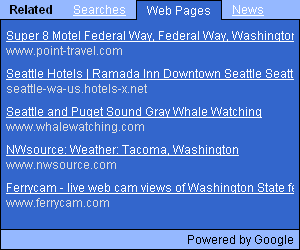Google Maps for Europe & the Rise of GeoTagging
A couple of weeks ago when I was writing the joke article on optimizing roof ads for Google Maps, I happened across this weird satellite picture when browsing the downtown area of my city, Dallas:
(This weird situation of buildings apparently leaning into one another is caused when two or more satellite pictures, each taken at different angles to the buildings, are stitched together. This phenomenon is referred to colloquially as the “Google Escher Effect”.)
I thought it was particularly amusing, so I posted the screen capture to my account on Flickr, and then sent it out to a few friends, and lazily posted it to a number of groups in Flickr that would have an interest in the pic. When researching appropriate related groups in Flickr, I noticed that there are quite a few groups dedicated to “GeoTagging” — this new and rising trend is something that’s got a lot of potential which businesses involved in local search may not be aware of yet, so I thought I’d mention just a few details and ideas on the subject in conjunction with Google Maps expanding their level of detail for European maps.
Possible Related Posts
Posted by Chris of Silvery on 04/26/2006
Permalink | |  Print
| Trackback | Comments Off on Google Maps for Europe & the Rise of GeoTagging | Comments RSS
Print
| Trackback | Comments Off on Google Maps for Europe & the Rise of GeoTagging | Comments RSS
Filed under: Google, Local Search, Local Search Optimization, Maps GeoTagging, Google, Google-Maps, internet-trends
The Keyword Index Is Out: $1.39, On Avg.
Interestinghttp://battellemedia.com/archives/002496.phpFathom’s quarterly index is out, and prices “eased� a bit (3%). Average keyword price is $1.39. From the release:
(more…)
Possible Related Posts
Posted by Brian of Brian on 04/21/2006
Permalink | |  Print
| Trackback | Comments Off on The Keyword Index Is Out: $1.39, On Avg. | Comments RSS
Print
| Trackback | Comments Off on The Keyword Index Is Out: $1.39, On Avg. | Comments RSS
Filed under: Keyword Research, Paid Search average-bid-amounts, Keyword Research, Keyword-Index, ppc
New Study – Importance of Rankings on Brand
36% of search engine users associate top rankings with brand leadership
In addition, 88% of users will change engines or search terms if they don’t find what they seek within the first three pages of search results, up from 78% in 2002.
Brian
Possible Related Posts
Posted by Brian of Brian on 04/21/2006
Permalink | |  Print
| Trackback | Comments Off on New Study – Importance of Rankings on Brand | Comments RSS
Print
| Trackback | Comments Off on New Study – Importance of Rankings on Brand | Comments RSS
Filed under: General, Market Data, Research and Development, Tracking and Reporting Branding, Searcher-Behavior
AdSense Spider Cross-Pollinates for Google
A few bloggers such as Jenstar have just posted that pages spidered by Google’s AdSense bot are appearing in Google’s regular search results pages. Shoemoney just blogged that Matt Cutts has officially verified that this is happening, saying that this was done so that they wouldn’t have to spider the same content twice, and that Google did this as part of their recent Big Daddy infrastructure improvements.
This has a couple of interesting ramifications for SEO professionals and those of us who are optimizing our sites for Google, since bot detection systems may now need to be updated and since this may essentially be a new way of committing site/page submissions into Google’s indices. And we all thought automated URL submissions were dead! I’ll explain further…. (more…)
Possible Related Posts
Posted by Chris of Silvery on 04/19/2006
Permalink | |  Print
| Trackback | Comments Off on AdSense Spider Cross-Pollinates for Google | Comments RSS
Print
| Trackback | Comments Off on AdSense Spider Cross-Pollinates for Google | Comments RSS
Filed under: Google, Spiders AdSense, bots, Googlebot, Robots.txt, Spiders, URL-submission
Optimize your roof ads for Google Maps
Since SEMs and SEOs are trying to use every way possible to increase their site exposure and ad visibility in the search engines, I thought it would be a good time to provide some tips on how to properly and effectively optimize your rooftop ads to appear in Google Maps.
Now, Danny Sullivan claimed that logos on rooftops are not intended for Google Maps, but this assertion is no longer correct, since I heard a recent segment in the last week on NPR about a rooftop ad company which is specifically gearing their ads to appear on the satellite images.
An article on Wired about that same company, RoofShout.com [7/14/08: link is now defunct], indicates that this may indeed be a viable new ad medium. For tips about how you can optimize for the rooftop media (which I will refer to as “SkySense Ads”), read on…
(more…)
Possible Related Posts
Posted by Chris of Silvery on 04/13/2006
Permalink | |  Print
| Trackback | Comments Off on Optimize your roof ads for Google Maps | Comments RSS
Print
| Trackback | Comments Off on Optimize your roof ads for Google Maps | Comments RSS
Filed under: Content Optimization, General, Google, Search Engine Optimization, SEO, Tricks April-Fools, Google, Google-Maps, Search Engine Optimization, SEO
Can you believe Google’s estimated number of search results?
I’ve never had much faith in Google’s estimated number of results (and for good reason). Every so often I run queries that I know will return a huge results set and I note the number of pages found, such as for “the” or “http”. The number of results just get bigger and bigger, like the length of the preverbial “fish that got away” with each telling of the tale! Continue reading…
Continue reading »Possible Related Posts
Posted by stephan of stephan on 04/12/2006
Permalink | |  Print
| Trackback | Comments Off on Can you believe Google’s estimated number of search results? | Comments RSS
Print
| Trackback | Comments Off on Can you believe Google’s estimated number of search results? | Comments RSS
Filed under: Google, Searching, Yahoo
Plenty of Traffic
Plentyoffish.com was recently reported to have over $300k in AdSense revenue per month, according to an exclusive interview with the creator, Markus Frind.
In a forum on WebmasterWorld, one thing Markus Frind suggested for those wishing to be successful as AdSense publishers really stood out for me:
“Do not enter markets with a lot of competition monitized via adsense. Try and undercut paid content markets by offering a free service, or better yet create your own market.”
So, there you have a great formula for success: choose an industry that charges fees for access to info/content, and offer it for free, paid by the contextual advertising.
Newspaper Industry: are you listening?
Continue reading »Possible Related Posts
Posted by Chris of Silvery on 04/09/2006
Permalink | |  Print
| Trackback | Comments Off on Plenty of Traffic | Comments RSS
Print
| Trackback | Comments Off on Plenty of Traffic | Comments RSS
Filed under: Best Practices, General AdSense, Google, Google-AdSense
Google Releases New Related Links Feature
Google Labs has just released a new feature called Google Related Links which allows webmasters to place a little tabbed user-interface navigation box on their site. The box will pull in links to sites related to the content on your webpage, allowing you to display related links to Searches, News, and Web Pages.
I’ve copied a screengrab below so that you can see how the real thing looks:

Perhaps this is a useful feature for some, but I’m thinking that most web editors prefer to choose their own related links and are better able to choose appropriate ones than this automated option.
So, are there other incentives to adding the code?
Their FAQ states that they do not pay publishers for adding the feature “at this time”. This would seem to hint that they’re considering paying for the referral traffic, which I think that most publishers would agree that they should.
A question: will Google bias the links supplied by this application towards searches which have better pay-for-performance ad revenue for themselves?
There’s something just a hair insidious seeming about this as well, however. On the PR face of it, Google represents that they want to help people out, make life easier, and enable people to find what they want to find on the web. But, Google is integrating itself more and more deeply into people’s websites, increasing dependency upon them. They provide search services for sites already, they’ve launched applications to allow people to design webpages through them, and they’re providing people with free web usage reporting and maps.
If there’s one thing that people have learned within the IT disaster recovery industry, placing too much dependency upon a single entity will create a single point of failure in a system. Admittedly, Google has nice infrastructure, but have you ever seen a company yet that never had a technical failure of some sort? What happens as increasing amounts of the internet itself is supported by Google, rather than by distributed systems?
In any case, it will be interesting to watch how many sites adopt this new feature without monetary incentives to do so.
Continue reading »Possible Related Posts
Posted by Chris of Silvery on 04/05/2006
Permalink | |  Print
| Trackback | Comments Off on Google Releases New Related Links Feature | Comments RSS
Print
| Trackback | Comments Off on Google Releases New Related Links Feature | Comments RSS
Filed under: Dynamic Sites, General, Google, Research and Development, Tools


